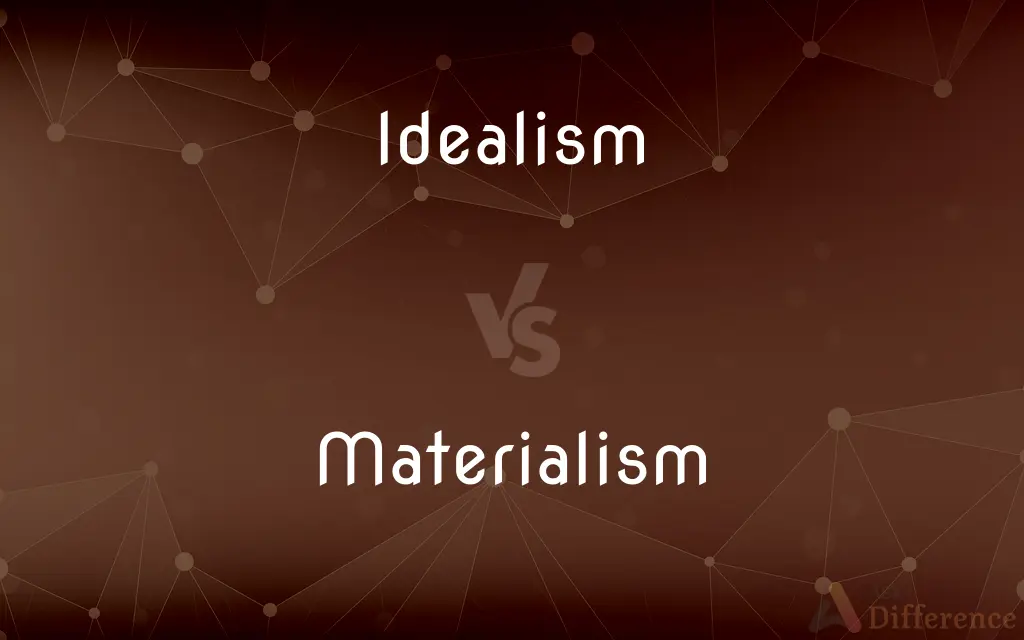Idealism vs. Materialism — What's the Difference?
Edited by Tayyaba Rehman — By Fiza Rafique — Updated on October 5, 2023
Idealism posits that ideas or consciousness form reality's basis; Materialism asserts that physical matter is the primary reality.

Difference Between Idealism and Materialism
Table of Contents
ADVERTISEMENT
Key Differences
Idealism is a philosophical view that asserts that immaterial ideas or consciousness are the most fundamental and essential aspects of reality. Materialism, on the other hand, argues that tangible, physical matter is the foundational substance of reality and that everything, including consciousness, is a result of material interactions.
At its core, Idealism places emphasis on the mental and spiritual dimensions, suggesting that everything we perceive stems from our thoughts and perceptions. Materialism contends that it's the other way around; our thoughts and perceptions arise from physical interactions in the brain and elsewhere.
Some proponents of Idealism assert that the physical world we perceive is simply a mental construct or projection. Materialism, conversely, posits that the mind and its thoughts are constructs created by physical processes.
Idealism often ties into religious or spiritual perspectives, suggesting the existence of a higher, non-material reality. Materialism generally leans towards scientific explanations, emphasizing the importance of empirical evidence derived from our physical world.
Historically, many ancient and modern philosophies have grappled with the tension between Idealism and Materialism, each offering distinct viewpoints on questions like the nature of existence, the origins of consciousness, and the fabric of reality itself.
ADVERTISEMENT
Comparison Chart
Basis of Reality
Ideas or consciousness
Physical matter
View on Consciousness
Primary and shapes reality
Result of material interactions
Origins of Perception
Stem from thoughts and inner consciousness
Arise from physical interactions
Religious Ties
Often aligns with spiritual beliefs
Typically leans towards empirical evidence
Historical Associations
Associated with thinkers like Plato
Linked with figures like Karl Marx
Compare with Definitions
Idealism
The belief that reality is shaped by ideas and consciousness.
Plato's theory of forms is rooted in Idealism.
Materialism
A philosophy emphasizing tangible, empirical evidence.
Her research on the origin of life was grounded in Materialism.
Idealism
A philosophy that posits intangible entities over the material world.
She argued that love, an intangible emotion, was a clear evidence of Idealism.
Materialism
The belief that material or physical reality is the only reality.
His trust in the scientific method was rooted in Materialism.
Idealism
A doctrine emphasizing the mental or spiritual realm.
His view on the afterlife leaned towards Idealism.
Materialism
The theory that everything, including thoughts, has a material basis.
He argued that even love had a chemical basis, a view in line with Materialism.
Idealism
The theory that objects only exist as ideas within the mind.
The painting showcased the artist's deep connection with Idealism.
Materialism
Materialism is a form of philosophical monism that holds that matter is the fundamental substance in nature, and that all things, including mental states and consciousness, are results of material interactions. According to philosophical materialism, mind and consciousness are by-products or epiphenomena of material processes (such as the biochemistry of the human brain and nervous system), without which they cannot exist.
Idealism
In philosophy, idealism is a diverse group of metaphysical views which all assert that "reality" is in some way indistinguishable or inseparable from human perception and/or understanding, that it is in some sense mentally constructed, or that it is otherwise closely connected to ideas. In contemporary scholarship, traditional idealist views are generally divided into two groups.
Materialism
(Philosophy) The doctrine that physical matter is the only reality and that everything, including thought, feeling, mind, and will, can be explained in terms of matter and physical phenomena.
Idealism
The unrealistic belief in or pursuit of perfection
The idealism of youth
Materialism
The theory or attitude that physical well-being and worldly possessions constitute the greatest good and highest value in life.
Idealism
Any of various systems of thought in which the objects of knowledge are held to be in some way dependent on the activity of mind.
Materialism
Concern for possessions or material wealth and physical comfort, especially to the exclusion of spiritual or intellectual pursuits.
Idealism
The act or practice of envisioning things in an ideal and often impractical form.
Materialism
Constant concern over material possessions and wealth; a great or excessive regard for worldly concerns.
Idealism
Pursuit of one's ideals, often without regard to practical ends.
Materialism
(philosophy) The philosophical belief that nothing exists beyond what is physical.
Idealism
Idealized treatment of a subject in literature or art.
Materialism
Material substances in the aggregate; matter.
Idealism
(Philosophy) The theory that the object of external perception, in itself or as perceived, consists of ideas.
Materialism
The doctrine of materialists; materialistic views and tenets; called also philosophical materialism.
The irregular fears of a future state had been supplanted by the materialism of Epicurus.
Idealism
The property of a person of having high ideals that are usually unrealizable or at odds with practical life.
Materialism
The tendency to give undue importance to material interests as contrasted with spiritual concerns; devotion to the material nature and its wants.
Idealism
The practice or habit of giving or attributing ideal form or character to things; treatment of things in art or literature according to ideal standards or patterns;—opposed to realism.
Materialism
Material substances in the aggregate; matter.
Idealism
(philosophy) An approach to philosophical enquiry, which asserts that direct and immediate knowledge can only be had of ideas or mental pictures.
Materialism
A desire for wealth and material possessions with little interest in ethical or spiritual matters
Idealism
The quality or state of being ideal.
Materialism
(philosophy) the philosophical theory that matter is the only reality
Idealism
Conception of the ideal; imagery.
Materialism
A perspective prioritizing physical possessions and comforts.
The consumer culture of the 21st century often leans towards Materialism.
Idealism
The system or theory that denies the existence of material bodies, and teaches that we have no rational grounds to believe in the reality of anything but ideas and their relations.
Materialism
The doctrine that consciousness and emotions arise from physical processes.
Modern neuroscience often aligns with the principles of Materialism.
Idealism
The practice or habit of giving or attributing ideal form or character to things; treatment of things in art or literature according to ideal standards or patterns; - opposed to realism.
Idealism
A belief in the feasibility of the implementation of ideal principles and noble goals, and the practice or habit of pursuing such goals; - opposed to realism and cynicism.
Idealism
(philosophy) the philosophical theory that ideas are the only reality
Idealism
Impracticality by virtue of thinking of things in their ideal form rather than as they really are
Idealism
Elevated ideals or conduct; the quality of believing that ideals should be pursued
Idealism
The conviction that ideals can and should influence reality.
The civil rights movement was driven by a strong sense of Idealism.
Common Curiosities
Are Idealism and Materialism opposing views?
Yes, while Idealism emphasizes immaterial ideas as the basis of reality, Materialism emphasizes physical matter.
Can someone believe in both Idealism and Materialism?
While they are traditionally opposing views, some philosophical frameworks might attempt to integrate elements from both.
What is Idealism?
Idealism is a philosophical stance asserting that ideas or consciousness are the primary components of reality.
Is Idealism tied to religion?
Idealism often aligns with spiritual or religious beliefs but isn't exclusively a religious viewpoint.
Which famous philosopher is associated with Idealism?
Plato is one of the most notable philosophers associated with Idealism.
How do Materialists view thoughts and ideas?
Materialists generally believe thoughts and ideas arise from material interactions, especially within the brain.
What is Materialism?
Materialism is the belief that physical matter is the fundamental substance of reality, with consciousness and ideas arising from it.
Who might be associated with Materialism?
Karl Marx is one figure associated with Materialist thought.
Is Materialism strictly atheistic?
While Materialism emphasizes the physical, it doesn't necessarily negate spiritual beliefs but often leans towards empirical evidence.
Does Idealism negate the existence of the physical world?
Not necessarily. Some forms of Idealism contend the physical world is a projection of consciousness, not that it doesn't exist.
Can one shift from Idealism to Materialism or vice versa?
Yes, philosophical perspectives can evolve based on experiences, learnings, and introspection.
How do Idealists view the origin of consciousness?
Idealists typically see consciousness as primary, with the material world emanating from it.
Can Materialism explain phenomena like love or morality?
Materialists might argue these concepts arise from physical processes or evolutionary advantages, though the depth and scope of such explanations can vary.
Does Materialism argue that emotions are just chemical reactions?
From a Materialist viewpoint, emotions can be seen as arising from physical processes, including chemical reactions in the brain.
Is Idealism subjective?
Idealism often places emphasis on individual consciousness and perceptions, making it inherently subjective in nature.
Share Your Discovery

Previous Comparison
Whiskey vs. Rum
Next Comparison
Pep vs. VimAuthor Spotlight
Written by
Fiza RafiqueFiza Rafique is a skilled content writer at AskDifference.com, where she meticulously refines and enhances written pieces. Drawing from her vast editorial expertise, Fiza ensures clarity, accuracy, and precision in every article. Passionate about language, she continually seeks to elevate the quality of content for readers worldwide.
Edited by
Tayyaba RehmanTayyaba Rehman is a distinguished writer, currently serving as a primary contributor to askdifference.com. As a researcher in semantics and etymology, Tayyaba's passion for the complexity of languages and their distinctions has found a perfect home on the platform. Tayyaba delves into the intricacies of language, distinguishing between commonly confused words and phrases, thereby providing clarity for readers worldwide.















































